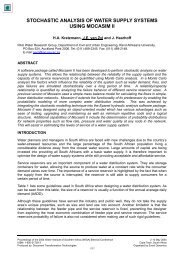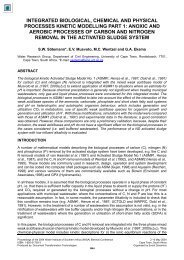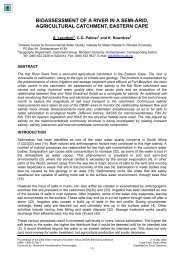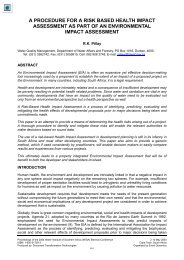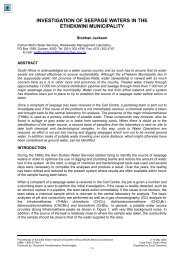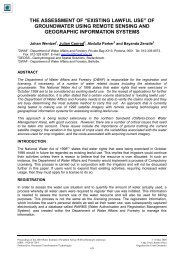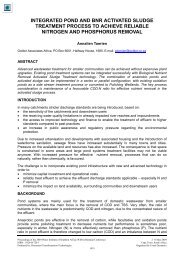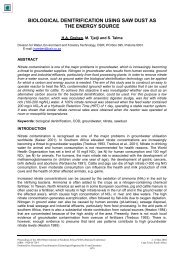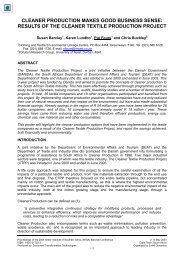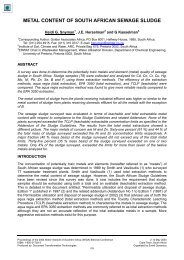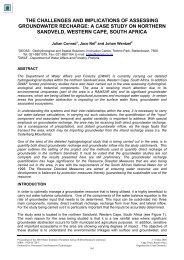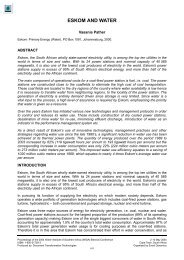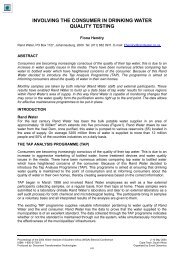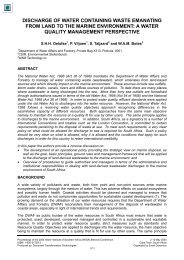Franchising in the Water Services Sector in South Africa
Franchising in the Water Services Sector in South Africa
Franchising in the Water Services Sector in South Africa
You also want an ePaper? Increase the reach of your titles
YUMPU automatically turns print PDFs into web optimized ePapers that Google loves.
FRANCHISING IN THE WATER SERVICES SECTOR IN<br />
SOUTH AFRICA<br />
Kev<strong>in</strong> Wall<br />
Boutek, CSIR, PO Box 395 Pretoria 0001. Cell: 082-459-3618. E-mail: kwall@csir.co.za<br />
ABSTRACT<br />
There is a need for <strong>in</strong>stitutional <strong>in</strong>novations aimed at <strong>in</strong>creas<strong>in</strong>g <strong>the</strong> coverage of water services <strong>in</strong><br />
<strong>South</strong> <strong>Africa</strong>, and susta<strong>in</strong><strong>in</strong>g those services.<br />
The paper describes an <strong>in</strong>vestigation <strong>in</strong>to an alternative service delivery <strong>in</strong>stitutional model, viz <strong>the</strong><br />
franchis<strong>in</strong>g of water services. The paper describes how a franchise model could be developed and<br />
made available to emerg<strong>in</strong>g entrepreneurs as <strong>the</strong> basis of a viable bus<strong>in</strong>ess. The franchise would<br />
be <strong>in</strong> respect of a component of <strong>the</strong> water services value cha<strong>in</strong> that is suitable for small bus<strong>in</strong>ess <strong>in</strong><br />
that it can be readily systematised.<br />
INTRODUCTION<br />
The capacity of many municipalities <strong>in</strong> <strong>South</strong> <strong>Africa</strong> to adequately provide even basic levels of<br />
water services to all <strong>the</strong>ir citizens is <strong>in</strong> question. The need for new alternative service provider<br />
<strong>in</strong>stitutions is apparent.<br />
Both Rand <strong>Water</strong> and <strong>the</strong> National Department of <strong>Water</strong> Affairs (DWAF) have for a number of<br />
years considered that <strong>the</strong> potential for franchis<strong>in</strong>g <strong>in</strong> <strong>the</strong> water services <strong>in</strong>dustry water ought to be<br />
<strong>in</strong>vestigated. For various reasons this has never been done.<br />
THE BOUTEK REPORT<br />
The paper describes <strong>the</strong> first phase of an <strong>in</strong>vestigation, funded by CSIR and <strong>the</strong> <strong>Water</strong> Research<br />
Commission, and undertaken by Boutek CSIR, <strong>in</strong>to franchis<strong>in</strong>g <strong>in</strong> <strong>the</strong> water services sector <strong>in</strong><br />
<strong>South</strong> <strong>Africa</strong>.<br />
This phase comprised:<br />
• sett<strong>in</strong>g <strong>the</strong> scene of water services delivery <strong>in</strong> <strong>South</strong> <strong>Africa</strong><br />
• background <strong>in</strong>vestigation <strong>in</strong>to franchis<strong>in</strong>g generically (i.e. not <strong>in</strong> <strong>the</strong> water services sector) --<br />
research of <strong>the</strong> literature, <strong>in</strong>ternational and <strong>South</strong> <strong>Africa</strong>n experience and best practice, and of<br />
<strong>the</strong> environment<br />
• background <strong>in</strong>vestigation <strong>in</strong>to research <strong>in</strong>to and experience <strong>in</strong> franchis<strong>in</strong>g <strong>in</strong> <strong>the</strong> water services<br />
sector; and<br />
• <strong>in</strong>vestigation <strong>in</strong>to appropriateness of franchis<strong>in</strong>g to <strong>the</strong> water services sector <strong>in</strong> <strong>South</strong> <strong>Africa</strong><br />
This report constitutes <strong>the</strong> first step towards a framework for franchis<strong>in</strong>g <strong>in</strong> <strong>the</strong> water services<br />
sector <strong>in</strong> <strong>South</strong> <strong>Africa</strong>.<br />
THE FINDINGS<br />
Municipalities <strong>in</strong> <strong>South</strong> <strong>Africa</strong> already have a huge responsibility for water services operation and<br />
ma<strong>in</strong>tenance -- DBSA, DWAF and DPLG (through CMIP) alone between 1994 and 2003 funded of<br />
<strong>the</strong> order of at least R15 billion <strong>in</strong>vestment <strong>in</strong> water services new works, upgrad<strong>in</strong>g and<br />
rehabilitation. All of this, and also <strong>the</strong> <strong>in</strong>frastructure funded by o<strong>the</strong>r means, has become <strong>the</strong><br />
responsibility of municipalities to operate and ma<strong>in</strong>ta<strong>in</strong>. In addition, millions of <strong>South</strong> <strong>Africa</strong>ns do<br />
not enjoy safe water and/or acceptable sanitation -- this represents a huge responsibility for <strong>the</strong><br />
Proceed<strong>in</strong>gs of <strong>the</strong> 2004 <strong>Water</strong> Institute of Sou<strong>the</strong>rn <strong>Africa</strong> (WISA) Biennial Conference 2 –6 May 2004<br />
ISBN: 1-920-01728-3 Cape Town, <strong>South</strong> <strong>Africa</strong><br />
Produced by: Document Transformation Technologies Organised by Event Dynamics
construction of new <strong>in</strong>frastructure and, after its construction, its operation and ma<strong>in</strong>tenance.<br />
Even if all <strong>the</strong> exist<strong>in</strong>g <strong>in</strong>stitutional roleplayers were cop<strong>in</strong>g with <strong>the</strong> water services delivery<br />
responsibility, <strong>the</strong>re would be good reason to <strong>in</strong>vestigate alternative <strong>in</strong>stitutional models, on <strong>the</strong><br />
grounds that it needs to be found out if alternatives:<br />
• could be more cost-effective<br />
• could allow exist<strong>in</strong>g roleplayers to focus on <strong>the</strong>ir o<strong>the</strong>r responsibilities, or<br />
• could offer a range of o<strong>the</strong>r advantages (<strong>in</strong>clud<strong>in</strong>g greater community participation)<br />
However, even <strong>in</strong> <strong>the</strong> well-resourced cities, water losses, for example, are significant, due largely<br />
to a legacy of underfunded ma<strong>in</strong>tenance budgets and <strong>in</strong>adequate ma<strong>in</strong>tenance practices.<br />
Generally, <strong>the</strong> situation is worse <strong>in</strong> <strong>the</strong> less well-resourced areas.<br />
Thus, given that <strong>the</strong> exist<strong>in</strong>g <strong>in</strong>stitutional roleplayers are clearly not cop<strong>in</strong>g with all <strong>the</strong> needs, <strong>the</strong>re<br />
is def<strong>in</strong>itely a "push factor" reason to <strong>in</strong>vestigate alternative <strong>in</strong>stitutional models for water services<br />
delivery.<br />
Internationally, it has been recognised that <strong>the</strong>re is a need for partnerships between public, private<br />
and civil <strong>in</strong>stitutions to achieve water services delivery objectives. The variety of partnerships that<br />
has been implemented, viz. private sector concessions, Build-Operate-Transfer (BOT),<br />
Build-Operate-Tra<strong>in</strong>-Transfer (BOTT), etc., has enjoyed mixed success overseas and <strong>in</strong> <strong>South</strong><br />
<strong>Africa</strong>. These have generally been "big bus<strong>in</strong>ess" partnerships for large scale contracts, and<br />
generally <strong>in</strong>vestment (public or private) <strong>in</strong> new <strong>in</strong>frastructure plays a prom<strong>in</strong>ent role.<br />
There is an alternative service delivery <strong>in</strong>stitutional model that is suited more for <strong>the</strong> ongo<strong>in</strong>g<br />
operation and ma<strong>in</strong>tenance of water services systems, ra<strong>the</strong>r than for <strong>in</strong>vestment <strong>in</strong> new<br />
<strong>in</strong>frastructure -- and that is friendly to small bus<strong>in</strong>ess. This alternative is <strong>the</strong> franchis<strong>in</strong>g of water<br />
services. However <strong>the</strong>re is little experience of this approach anywhere <strong>in</strong> <strong>the</strong> world, and no<br />
experience <strong>in</strong> <strong>South</strong> <strong>Africa</strong> -- although some partnerships have some of <strong>the</strong> characteristics of <strong>the</strong><br />
franchise approach.<br />
The barriers to entry for <strong>the</strong> smaller or start-up company are substantial. But if <strong>the</strong>se could be<br />
overcome, perhaps through franchis<strong>in</strong>g, <strong>the</strong>n <strong>the</strong>re will be many opportunities for local economic<br />
development.<br />
The tw<strong>in</strong> driv<strong>in</strong>g forces of <strong>the</strong> franchis<strong>in</strong>g concept are:<br />
• an <strong>in</strong>centive <strong>in</strong> <strong>the</strong> form of a focused and quantifiable f<strong>in</strong>ancial outcome (profits, dividends or<br />
surplus), and<br />
• a successful bus<strong>in</strong>ess model that can be copied widely<br />
Nei<strong>the</strong>r of <strong>the</strong>se is currently <strong>in</strong> evidence <strong>in</strong> <strong>the</strong> water services sector. Fur<strong>the</strong>rmore, <strong>the</strong>re are many<br />
pitfalls when it comes to implementation even under <strong>the</strong> most favourable of circumstances.<br />
None<strong>the</strong>less for-profit franchis<strong>in</strong>g of commercial goods and services <strong>in</strong> <strong>South</strong> <strong>Africa</strong> is extensive,<br />
generally viable, and grow<strong>in</strong>g rapidly. Over 400 franchised systems operate through more than 26<br />
000 franchised outlets, and generate retail sales around 200 billion annually. There is much<br />
evidence that, everyth<strong>in</strong>g else be<strong>in</strong>g equal, franchised bus<strong>in</strong>esses have a far lower failure rate than<br />
do <strong>in</strong>dependent bus<strong>in</strong>esses. Net jobs have been created. A variety of organisations offer support of<br />
one sort or ano<strong>the</strong>r, sometimes at a price.<br />
<strong>Franchis<strong>in</strong>g</strong> (more correctly "bus<strong>in</strong>ess format franchis<strong>in</strong>g") is a way of accelerat<strong>in</strong>g <strong>the</strong><br />
development of a bus<strong>in</strong>ess, based on tried and tested methodology. The franchise system firstly<br />
correlates and systematises <strong>the</strong> bus<strong>in</strong>ess, and <strong>the</strong>n facilitates <strong>the</strong> sett<strong>in</strong>g up of <strong>the</strong> bus<strong>in</strong>ess, and<br />
supports and discipl<strong>in</strong>es it <strong>the</strong>reafter.
The card<strong>in</strong>al elements of <strong>the</strong> franchise process are:<br />
• identify<strong>in</strong>g a component of value cha<strong>in</strong> that is simple enough to systematise<br />
• discover<strong>in</strong>g best practice<br />
• systematis<strong>in</strong>g <strong>the</strong> bus<strong>in</strong>ess<br />
• select<strong>in</strong>g franchisors and franchisees<br />
• tra<strong>in</strong><strong>in</strong>g<br />
• preparation of operations manuals<br />
• research and development<br />
• cont<strong>in</strong>u<strong>in</strong>g support, control and discipl<strong>in</strong>e of <strong>the</strong> on-go<strong>in</strong>g bus<strong>in</strong>ess<br />
A survey of overseas literature, while admitt<strong>in</strong>g that <strong>the</strong> topic of water services franchis<strong>in</strong>g is a very<br />
new one, and implementation even at a pilot scale is yet to take place, concluded that water<br />
services franchis<strong>in</strong>g shows great promise. Especially this is so <strong>in</strong> respect of water services to<br />
towns and to multi-village schemes. However franchis<strong>in</strong>g would be by no means free of many of<br />
<strong>the</strong> issues that equally affect o<strong>the</strong>r water services provision alternatives -- franchis<strong>in</strong>g would be just<br />
as dependant on <strong>the</strong> criteria for susta<strong>in</strong>able operations be<strong>in</strong>g <strong>in</strong> place, <strong>in</strong> particular <strong>the</strong> criterion of<br />
f<strong>in</strong>ancial self susta<strong>in</strong>ability.<br />
The need <strong>in</strong> <strong>South</strong> <strong>Africa</strong> for less unemployment (to have of <strong>the</strong> order of 40% of those between 15<br />
and 65 unemployed is an <strong>in</strong>tolerable situation), for higher <strong>in</strong>come to households below subsistence<br />
level, and for more entrepreneurs, is universally acknowledged. Yet a recent study showed that<br />
<strong>South</strong> <strong>Africa</strong> has slipped three places to rank 22nd <strong>in</strong> a global entrepreneurship survey, <strong>in</strong>dicat<strong>in</strong>g<br />
failure to create a competitive climate <strong>in</strong> which emerg<strong>in</strong>g bus<strong>in</strong>esses can grow and thrive. Thus<br />
<strong>the</strong>re is without question a "pull factor", i.e. <strong>the</strong> need for local economic development, and <strong>in</strong><br />
particular <strong>the</strong> need for <strong>the</strong> creation and nurtur<strong>in</strong>g of SMMEs, that is a strong additional motivation<br />
to <strong>in</strong>vestigate franchis<strong>in</strong>g <strong>in</strong> <strong>South</strong> <strong>Africa</strong> as a water services delivery model <strong>in</strong> addition to, and<br />
probably complementary to, <strong>the</strong> current models.<br />
Resources allocated to a programme for <strong>the</strong> franchis<strong>in</strong>g of water services would be well spent <strong>in</strong><br />
terms of achiev<strong>in</strong>g susta<strong>in</strong>able jobs and entrepreneurs -- not to mention <strong>the</strong> water services delivery<br />
that would ensue. Many useful po<strong>in</strong>ters for <strong>the</strong> water services franchisee development programme<br />
that will be needed, if franchis<strong>in</strong>g of water services is to take off, can be found not only <strong>in</strong> bus<strong>in</strong>ess<br />
format franchis<strong>in</strong>g franchisee development programmes, but also <strong>in</strong> eng<strong>in</strong>eer<strong>in</strong>g <strong>in</strong>frastructure<br />
contractor development programmes that already have a track record <strong>in</strong> <strong>South</strong> <strong>Africa</strong> (for example<br />
<strong>the</strong> Soweto Contractor Development Programme).<br />
The Boutek report found that <strong>the</strong> great need for alternative water services provider systems, and<br />
for local economic development, is <strong>in</strong>disputable, and that <strong>the</strong>re is through water services<br />
franchis<strong>in</strong>g potential to simultaneously:<br />
• deliver water services, and<br />
• promote local economic development, SMME development and Black economic<br />
empowerment.<br />
Thus "franchisee" must be added to <strong>the</strong> list of possible water services provider types <strong>in</strong> <strong>South</strong><br />
<strong>Africa</strong>n water services practice.<br />
The Boutek report also found that it is essential to <strong>the</strong> success of water services franchis<strong>in</strong>g that,<br />
<strong>in</strong>ter alia:<br />
• service to customers meets <strong>the</strong> specification <strong>in</strong> <strong>the</strong> franchise contract with <strong>the</strong> water services<br />
authority;<br />
• suitable franchisors are will<strong>in</strong>g and available;<br />
• local entrepreneurs are will<strong>in</strong>g to take up water services franchise opportunities;<br />
• franchis<strong>in</strong>g proves to be a viable bus<strong>in</strong>ess for franchisor and franchisee alike; and<br />
• <strong>the</strong> fund<strong>in</strong>g partners support water services franchis<strong>in</strong>g <strong>in</strong> just <strong>the</strong> same way as <strong>the</strong>y support <strong>in</strong><br />
comparable circumstances water services provision by o<strong>the</strong>r <strong>in</strong>stitutional means.
On <strong>the</strong> last of <strong>the</strong>se po<strong>in</strong>ts: <strong>Franchis<strong>in</strong>g</strong> must benefit from <strong>the</strong> fund<strong>in</strong>g streams (e.g. equitable<br />
share, CMIP) to <strong>the</strong> water services authority to <strong>the</strong> same extent as with any o<strong>the</strong>r type of water<br />
services provider. Government will surely perceive that go<strong>in</strong>g <strong>the</strong> franchise route has <strong>in</strong> a<br />
significant number of circumstances at least as good or maybe an even a better chance of<br />
provid<strong>in</strong>g susta<strong>in</strong>able water services than o<strong>the</strong>r options have.<br />
It is not unreasonable to allow <strong>the</strong> pr<strong>in</strong>ciple that entrepreneurs can be contracted to supply water<br />
services, and take <strong>the</strong> profits that <strong>the</strong>ir contracts permit. There should be no ideological barrier to<br />
this -- and given that <strong>the</strong>re are currently not enough water services providers <strong>in</strong> <strong>South</strong> <strong>Africa</strong>,<br />
entrepreneurs should be offered <strong>the</strong> opportunity to see if <strong>the</strong>y can assist. However <strong>the</strong> case for<br />
franchis<strong>in</strong>g does not depend on <strong>the</strong> case for or aga<strong>in</strong>st <strong>the</strong> participation of for-profit organisations.<br />
There are currently some activities <strong>in</strong> <strong>the</strong> water services sector <strong>in</strong> <strong>South</strong> <strong>Africa</strong> that have parallels<br />
with franchis<strong>in</strong>g -- with differences, <strong>the</strong> most important of which is that <strong>the</strong> participants are<br />
generally not for-profits (<strong>in</strong> particular, that <strong>in</strong> which a water services authority appo<strong>in</strong>ts a "support<br />
services agent" to support smaller locally-based water services providers).<br />
Two organisations with <strong>the</strong> expertise and resources to play a franchisor role have expressed<br />
<strong>in</strong>terest, and <strong>the</strong>re is little doubt that o<strong>the</strong>rs would follow this lead.<br />
A <strong>South</strong> <strong>Africa</strong>n water services franchis<strong>in</strong>g programme must commence by learn<strong>in</strong>g from <strong>the</strong><br />
performance of o<strong>the</strong>r water services <strong>in</strong>stitutional arrangements, as <strong>the</strong> overseas research<br />
programmes have. Experience must also be derived from franchis<strong>in</strong>g experience <strong>in</strong> bus<strong>in</strong>ess<br />
sectors o<strong>the</strong>r than water services. Only <strong>the</strong>reafter can <strong>the</strong> implementation of such a programme be<br />
contemplated, and even <strong>the</strong>n at pilot scale as field experiments, and subject to structured research<br />
methodology. Fur<strong>the</strong>rmore, <strong>the</strong> <strong>in</strong>itial pilot<strong>in</strong>g must be done <strong>in</strong> <strong>the</strong> easiest of circumstances, where<br />
<strong>the</strong>re is <strong>the</strong> greatest chance of success. If pilot<strong>in</strong>g is attempted <strong>in</strong> a problematic area, and if <strong>the</strong><br />
pilot is not completely successful, not enough would have been learned from <strong>the</strong> pilot<br />
implementation to draw any worthwhile conclusions.<br />
The Boutek report concluded that:<br />
• <strong>the</strong> potential of water services franchis<strong>in</strong>g <strong>in</strong> <strong>South</strong> <strong>Africa</strong> is clearly demonstrated; and<br />
• <strong>the</strong> circumstances are now entirely right for a more <strong>in</strong>-depth <strong>in</strong>vestigation <strong>in</strong>to water services<br />
franchis<strong>in</strong>g.



